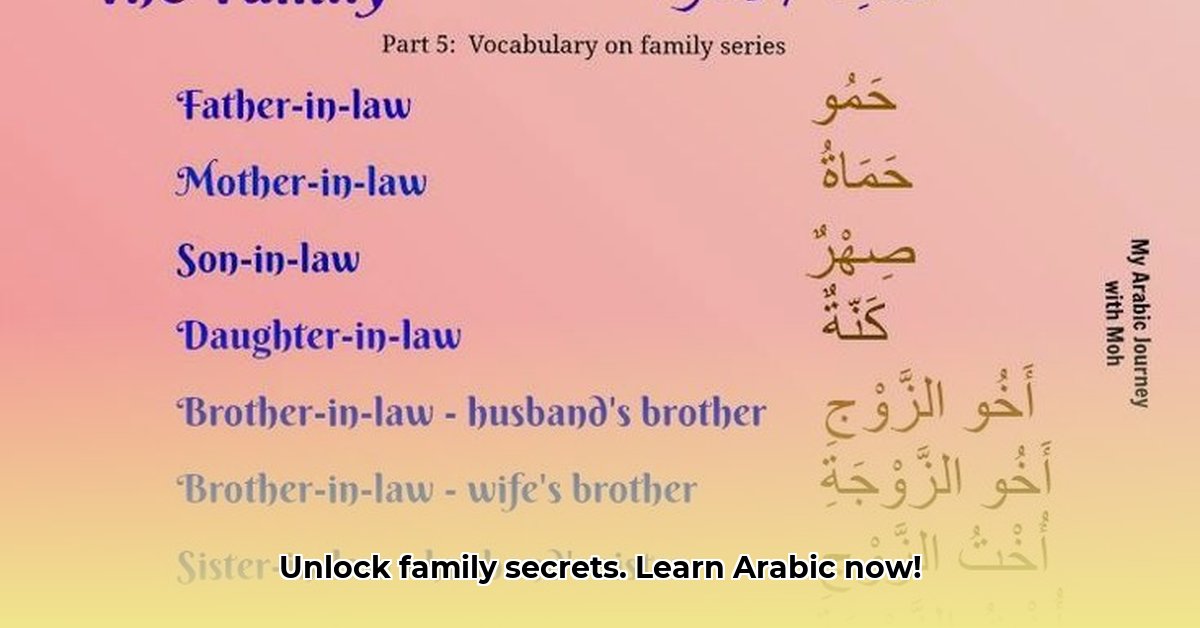
Getting to Know Your Arabic Family
Learning Arabic family terms isn't just about memorizing words; it's about gaining cultural insight and building deeper connections. This guide will equip you with the knowledge to navigate the complexities of Arabic family vocabulary, focusing on the word for "brother" and its multifaceted usage. Ready to begin? For a deeper dive into "brother" in Arabic, check out this helpful resource: Arabic word for brother.
Basic Arabic Family Vocabulary
Let's start with the foundational words. Think of these as the alphabet of Arabic family relationships. Accurate pronunciation is crucial; try listening to native speakers online to perfect your skills.
| Arabic Word | English Translation | Approximate Pronunciation | Example Sentence (and Translation) |
|---|---|---|---|
| أخ (akh) | Brother | /ʔax/ | أخي كبير. (Akhi kabīr.) - My brother is older. |
| أخت (ukht) | Sister | /ʊxt/ | أختي صغيرة. (Ukhti ṣaghīra.) - My sister is younger. |
| أب (ab) | Father | /ʔab/ | أبي طبيب. (Abī ṭabīb.) - My father is a doctor. |
| أم (umm) | Mother | /ʔumm/ | أمي جميلة. (Ummī jamīla.) - My mother is beautiful. |
| ابن (ibn) | Son | /ɪbn/ | ابني ذكي. (Ibnī ðakī.) - My son is intelligent. |
| بنت (bint) | Daughter | /bɪnt/ | بنتي جميلة. (Binti jamīla.) - My daughter is beautiful. |
Formal vs. Informal Arabic: Respect and Relationships
Arabic distinguishes between formal and informal language, significantly impacting how you address family members. This reflects the deep-rooted respect for elders and social hierarchy within Arab cultures. Have you ever noticed how you address your own family members differently in formal and informal settings? The same principle applies in Arabic.
Using the correct level of formality shows cultural sensitivity and builds trust. It demonstrates that you are making a genuine effort to connect with people on their terms. Could you imagine the impact of using a casual tone when speaking to an elder on a first meeting?
Understanding Kunya (Patronymic Names)
Kunya (كنية) adds another layer of complexity to Arabic family vocabulary. It's a form of address using a person's child's name to refer to them. For example, if a man has a son named Ahmad, he might be called Abū Ahmad (أبو أحمد), meaning "Father of Ahmad." This isn't just a nickname; it's a respected and commonly used form of address. Mastering kunya demonstrates a sophisticated understanding of Arabic cultural nuances.
Dr. Layla El-Hasan, Professor of Arabic Linguistics at the University of Cairo, highlights the enduring significance of kunya in modern Arabic society, stating that, "Its use reflects respect for lineage and family structure, maintaining a traditional aspect of communication within the community."
Expanding "Brother" and "Sister": Beyond Blood Relations
The words akh (brother) and ukht (sister) aren't limited to blood relatives. Within close-knit communities, and particularly in religious contexts, these terms express strong bonds of friendship and shared faith. This reflects the emphasis on brotherhood and sisterhood prevalent in certain Arab cultures.
However, it's crucial to understand the cultural context and avoid imposing this level of familiarity inappropriately. Respecting individual boundaries remains paramount.
Regional Variations in Arabic Family Terms
Arabic is not a monolithic language; it has numerous regional dialects. While core vocabulary remains largely consistent, pronunciation and usage can vary significantly. This is similar to the differences between American and British English, or even between different regional dialects within the United States. Be aware of these variations, particularly when interacting with people from specific regions.
Putting It All Together: Practice Exercises
Let's solidify your learning with some practice exercises. Active recall significantly boosts retention.
Fill in the blanks: My __ (brother) is a teacher. My ____ (mother) is a doctor. (Use akh and umm)
Matching: Match the Arabic words with their English translations: أب (ab), أم (umm), أخ (akh), أخت (ukht). (Father, Mother, Brother, Sister)
Short Dialogue: Create a short dialogue introducing yourself to a friend's family, using appropriate formal and informal terms.
Key Takeaways:
- Mastering Arabic family terms significantly enhances communication and cultural understanding.
- Context is crucial; the appropriate level of formality depends on the relationship and setting.
- Regional variations exist, impacting pronunciation and usage.
By understanding and applying these principles, you'll confidently navigate the fascinating world of Arabic family vocabulary and build meaningful connections with Arabic speakers. Your journey has just begun!